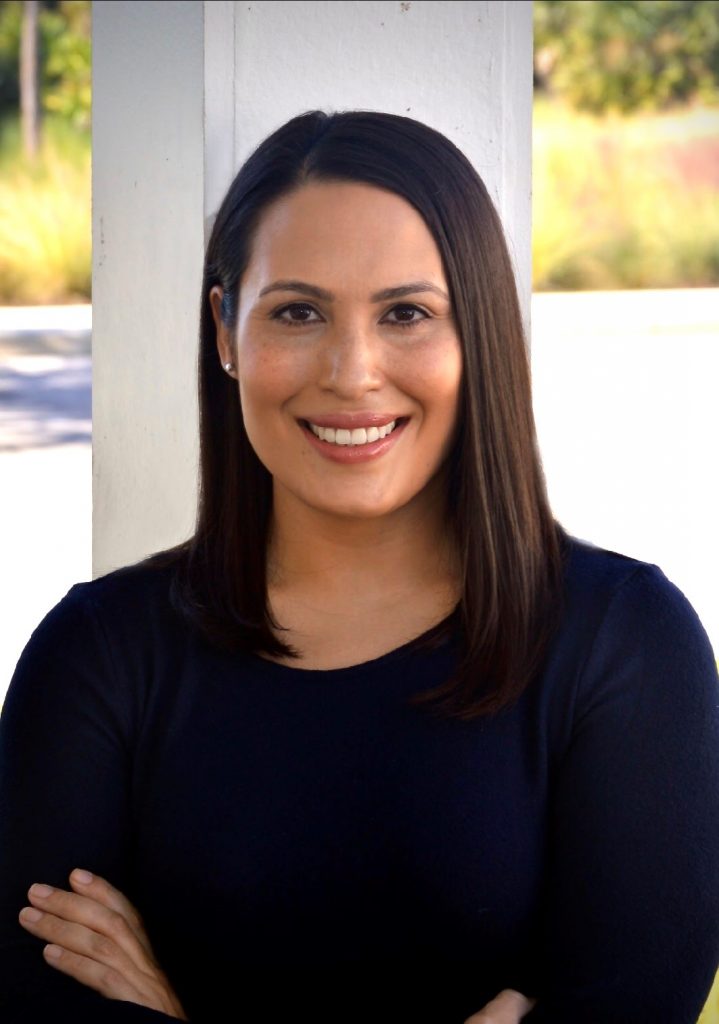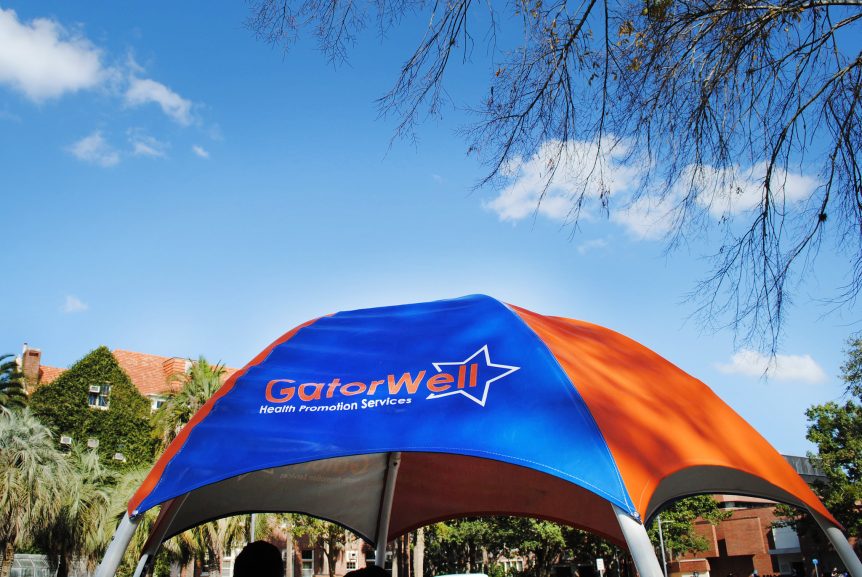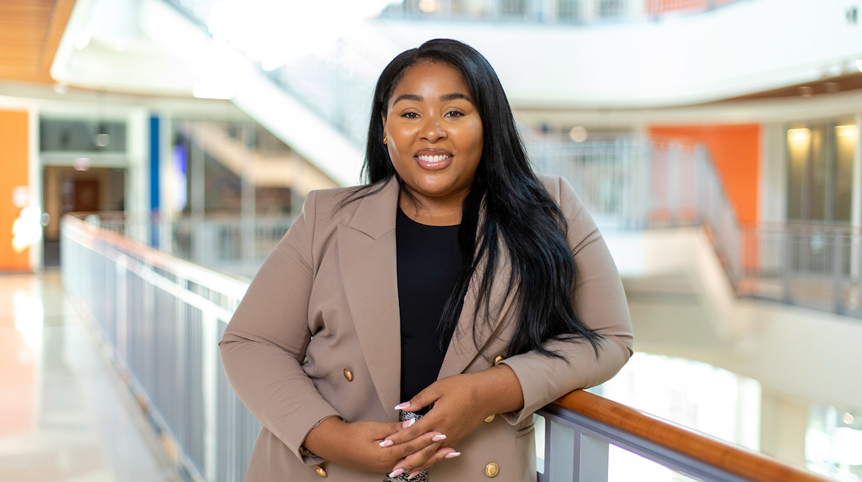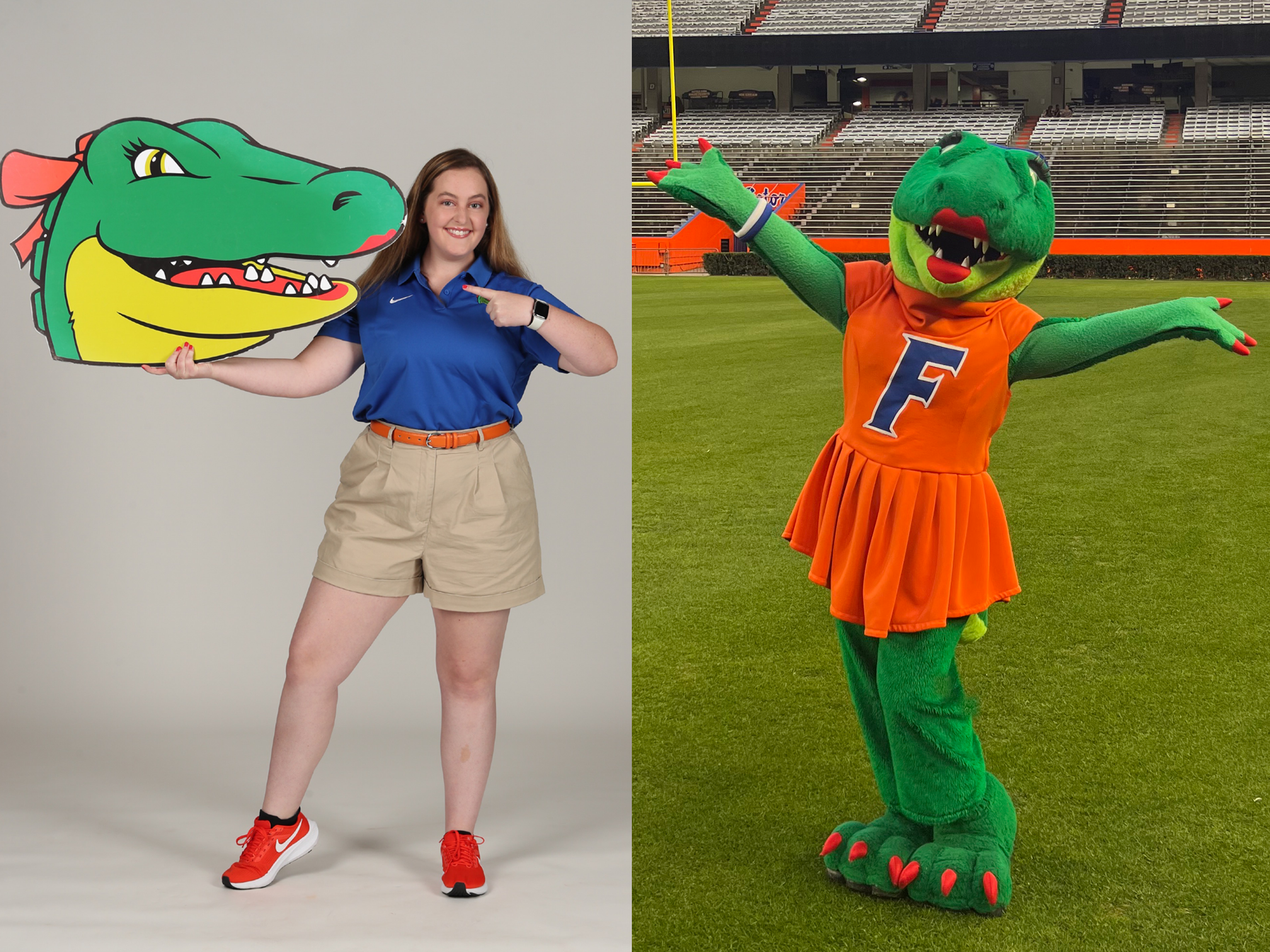Dr. Janelle Garcia graduated from the University of South Florida with plans to be physician, but she later pivoted to a career in health promotion and wellness — allowing her to impact quality of life more meaningfully and on a larger scale. Now, as the University of Florida’s new associate director at GatorWell Health Promotion Services, part of the Division of Student Life, she supports efforts to promote the physical and mental well-being of students.

Janelle Garcia began as the associate director of GatorWell in September. Photo courtesy of Janelle Garcia
Garcia, a double Gator with a master’s degree in applied physiology and kinesiology and a Ph.D. in health and human performance, is an expert on community-based health behavior education. Along the way, she has also amassed experience in overcoming professional and personal obstacles.
Her research has included topics such as food insecurity and peer-led health and wellness programming in high schools. She also spent nine years at the Johns Hopkins All Children’s Hospital in St. Petersburg, Florida, where she developed programs to address community-based health needs.
Now, Garcia hopes to apply a similar training model at UF by briefing peer leaders in health education while also offering resources and opportunities to learn from experts in a way that feels honest to students.
“I feel like what made me most successful in a lot of what I did before was being a really good listener and not being too proud to say, ‘I don’t really know the best way to do this’” she said. “Asking for their feedback and building programming off their needs and interests, instead of just assuming I know what that is.”
As associate director, Garcia uses these skills to support programs aimed at improving the health of the student body. To measure efficacy, she also collects data on the short- and long-term impact of GatorWell initiatives.
While working through the pandemic, Garcia said she developed a new set of skills rooted in building resilience after failure, or the ability to reflect on and learn from our setbacks. We asked her about this and how students can start practicing resilience in their own lives.
How did you first recognize the importance of learning to build resilience after failure?
I’m Type A, and I’ve always been very hard on myself, which has only caused more stress and anxiety during tough times . But what I found through the pandemic is that I am far more resilient than I gave myself credit for, and that self-realization led me to understand that I’m not the only one who has experienced this.
We all go through setbacks in life, and I was finding that some people were managing better than others. What is it about any one person that makes them better able to adjust during tough times versus another? Is this something that can be learned or taught?
The answer is yes; it can be taught, but it takes practice, an open mind and a lot of self-reflection and grace for yourself.
How do you define resilience in an academic or professional setting?
I’ve learned that to be resilient is to give as much attention to the good things that happen as you do to the bad things.
We tend to over-sensationalize when setbacks occur. We get very generalized and aggrandizing about things, like ‘I’m a failure’ or ‘I’m no good.’ And that’s just not true. Maybe you didn’t do great at this one thing, but there’s something you can learn from that.
Instead of dwelling on your failures, resilience is understanding that challenges do arise in life, but they can be overcome with thoughtfulness and grace. It’s taking that look back over your shoulder, going ‘I see what I could have done differently there’ or ‘I see what was out of my control. I’m going to cut myself some slack on that’ and then growing from it.
What are some tips for students who want to start practicing resilience?
First, give yourself some grace. Relax, take a breath and don’t just react in the moment. Give yourself a minute to adjust.
Be very aware of your thoughts. Again, don’t over-sensationalize a tough situation. Yes, it’s tough, but you can overcome it. Optimists are far more resilient than pessimists. A lot of times, the way we react to things is the way our parents or those closest to us react. So, if you find that you’re around people who are more pessimistic, it might be tougher for you to not over-sensationalize. If that is your support system, you might need to find other ways to get support.
Practice cognitive restructuring, which is changing the way that you think about negative situations. Take the opportunity to learn from mistakes and failures. Instead of saying, ‘Oh, that just didn’t work out,’ recognize what you had control over and could do differently next time, as well as what really was out of your control. Choosing how you respond to situations is the one thing you actually have control over, so take a minute to not react and look at the bigger picture.
Set yourself SMART goals (goals that are specific, measurable, attainable, realistic and timely). Resilient people are goal oriented. They have a structured plan, but they also understand that the plan might change or they might have to go back and modify.
Build your self-confidence by recognizing that, eventually, you will succeed. You might make a few mistakes on the way, but you will find a way if you’re persistent enough. Build a strong support system of people who you can bounce ideas off.
And lastly, be flexible. Things aren’t always going to go the way you planned, and that’s okay.
Midterms just passed, and finals are coming up soon. How can students rebound after a bad test grade?
Take a step back, and try to be as objective as possible about the situation. Be very specific; dissect what went right and what went wrong. Instead of thinking, ‘I’m so stupid. I’m never going to pass this class,’ say, ‘Okay, I didn’t put in the sufficient amount of time that I needed to study. Maybe I could scale back on some of my social activities in the week leading up to the next exam.’ Or, if you did put in a ton of effort and it still didn’t turn out the way that you planned, say, ‘I tried really hard, and that’s great. I need to keep trying, but I might need to adjust the things that I’m focusing on.’
Maybe you just didn’t focus on the right topics or strategies for the last test, and you need to reset and reprioritize for the next exam. One great way to do that is to talk to your professors. The reality is professors appreciate students who care. So, whether you tried really hard or didn’t put in enough effort, touch base with your professor. Let them know that that wasn’t your best effort and you want to know how you can improve.
If there’s something that you’re not understanding, you can also check in with your peers in the class, and maybe they can help bridge that knowledge gap. But if that doesn’t work, go to your professor. They’re there to help you.
What does a resilient student body look like to you?
A resilient student body is one that not only supports itself but is supportive of one another. It’s having the empathy to know that you’re making mistakes in your life, and others are too. You have to be able to provide that level of grace because you’re going to need it one day, too.
But, at the same time, it’s also holding each other accountable. I hear this all the time with group projects: ‘Oh, well somebody is not pulling their weight.’ So, have that constructive conversation. See what’s going on. Maybe there’s something personal going on in their lives, and you can provide support or direct them to resources that can.
It’s cutting yourself some slack and doing the same for others. But it’s also growing from these situations, making ourselves better, not getting stuck in the past and not being overly negative. It’s keeping an optimistic outlook, having a sense of gratitude and living in the moment so that we can recognize the wonderful things that are happening each day.
What does building resilience after failure look like post-graduation?
Just as you may have experienced setbacks as a student, you can expect setbacks to occur after you graduate. Challenges may look a little different as you navigate job pressures, paying off student loans, managing personal relationships and generally adulting, but the resiliency skills needed to overcome these troubles remain the same.
A piece of advice I like to give to all new grads is that you will probably always feel like you do not know what you are doing, even with years of education under your belt. This still happens to me, so I know imposter syndrome is a very real thing! During these moments, you must remind yourself that you were taught by the best and brightest professors and were afforded incredible opportunities while a student at UF. Take a deep breath, quiet the negative self-talk, rely on your exemplary training and take the challenge one step at a time using the resources and support available to you.
Any final advice to students?
If you’re looking for help reprioritizing after a tough semester or you want to prepare for the new semester — come visit us in GatorWell. We offer a myriad of services in stress management, time management, sleep, alcohol and drug use, sexual health and intimate partner violence education.
We also offer wellness coaching, so we can work one-on-one with students who are dealing with any one of those topics or issues. If you’re facing a setback or challenge, a trained health promotion specialist can help guide you toward a solution.
You can sign up through our website, and one of our staff members will contact you with a plan for support.
Learn more about GatorWell Health Promotion Services.
Sign up for one-on-one wellness coaching.
Source: Janelle Garcia, garciajt@ufl.edu
Writer: Veronica Nocera, vnocera@ufsa.ufl.edu





